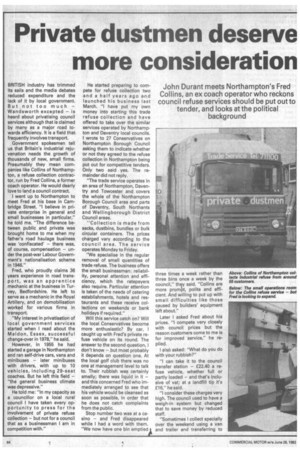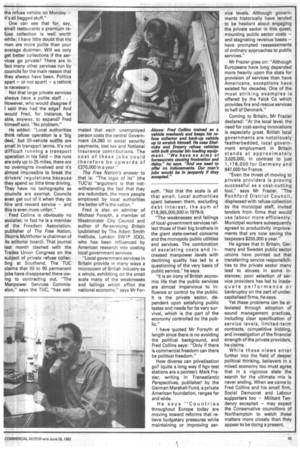Private dustmen deserve more consideration
Page 54

Page 55

If you've noticed an error in this article please click here to report it so we can fix it.
BRITISH industry has trimmed its sails and the media debates reduced expenditure and the lack of it by local government. But not too much — Wandsworth excepted — is heard about privatising council services although that is claimed by many as a major road towards efficiency_ It is a field that frequently involves transport.
Government spokesmen tell us that Britain's industrial rejuvenation needs the growth of thousands of new, small firms. Presumably they mean companies like Collins of Northampton, a refuse collection contractor, run by Fred Collins, a former coach operator. He would dearly love to land a council contract.
I went up to Northampton to meet Fred at his base in Cambridge Street. "I believe in private enterprise in general and small businesses in particular," he told me. "The difference between public and private was brought home to me when my father's road haulage business was 'confiscated' — there was, of course, compensation — under the post-war Labour Government's nationalisation scheme in 1946."
Fred, who proudly claims 36 years experience in road transport, was an apprentice mechanic at the business in Turvey, Bedfordshire. He left to serve as a mechanic in the Royal Artillery, and on demobilisation worked for various firms in transport.
"My interest in privatisation of local government services started when I read about the Maldon, Essex, successful change-over in 1978," he said.
However, in 1955 he had started a garage in Northampton and ran self-drive cars, vans and minibuses — later minibuses with drivers, with up to 10 vehicles, including 29-seat coaches. But he left this field — "the general business climate was depressive."
He told me: "In my capacity as a councillor on a local rural council I have taken every opportunity to press for the involvement of private refuse collection — but not for a council that as a businessman I am in competition with." He started preparing to com pete for refuse collection two and a half years ago and launched his business last March. "I have put my own money into starting this trade refuse collection and have offered to take over the similar services operated by Northampton and Daventry local councils. I wrote to 27 Conservatives on Northampton Borough Council asking them to indicate whether or not they agreed to the refuse collection in Northampton being put out for competitive tenders. Only two said yes. The remainder did not reply.
"The trade service operates in an area of Northampton, Daven try and Towcester and covers the whole of the Northampton Borough Council area and parts of Daventry, South Northants and Wellingborough District Council areas.
"Collection is made from sacks, dustbins, bundles or bulk circular containers. The prices charged vary according to the council area. The service operates Monday to Friday.
"We specialise in the regular removal of small quantities of trade refuse. The business offers the small businessman: reliability, personal attention and effi ciency, which the ratepayers also require. Particular attention is taken of the needs of catering establishments, hotels and restaurants and these receive collections on weekends or bank holidays if required."
Will this service catch on? Will the local Conservatives become more enthusiastic? By car, I caught up with Fred's private refuse vehicle on its round. The answer to the second question, I don't know — but most probably it depends on question one. At the local golf club there was no one at management level to talk to. Their rubbish was certainly smelly; there was liquid in it — and this concerned Fred who immediately arranged to see that his vehicle would be cleansed as soon as possible, in order that he does not catch complaints from the public.
Stop number two was at a casino — and Fred disappeared while I had a word with them. "We now have one bin emptiedak
three times a week rather than three bins once a week b the council," thy said. "Colli s are more prompt, polite and efficient. And willing to put u with small difficulties like those caused by builders' equipment left about."
Later I asked Fred abo t his prices. "I compete very cl sely with council prices but the reason customers come to ne is for improved service," h replied.
I also asked: "What do y u do with your rubbish?"
"I can take it to the council transfer station — £22.40 la refuse vehicle, whether full or partly loaded — and that's !nclusive of vat; at a landfill tip it's £16," he said.
"I consider these charged very high. The council used to hive a weigh-in system but changed that to save money by reduced staff.
"Sometimes I collect specially over the weekend using a van and trailer and transferring to the refuse vehicle on Monday — it's all bagged stuff."
One can see that for, say, small restaurants a premium refuse collection is well worth while; I have little doubt that his men are more polite than your average dustmen. Will we only get better collections if the services go private? There are in fact many other services run by councils for the main reason that they always have been. Politics apart — or not apart! — a rethink is necessary.
Not that large private services always have a polite staff . . . However, who would disagree if I said they had the edge? And would Fred, for instance, be able, anyway, to expand? Fred himself said, "No problem."
He added: "Local authorities think refuse operation is a 'big deal,' but 20-vehicle outfits are small in transport terms. It's not difficult running a transport operation in his field — the runs are only up to 25 miles, there are no overnights involved and it's almost impossible to break the drivers' regulations because they spend so little time driving. They have no tachographs as councils are exempt. Councils even get out of it when they do hire and reward service — and this is even more unfair."
Fred Collins is obviously no socialist; in fact he is a member of the Freedom Association, publisher of The Free Nation, (Norris McWhirter is chairman of its editorial board). That journal last month clashed with the Trades Union Congress on the subject of private refuse collecting at Southend. The TUC claims that 60 to 90 permanent jobs have disappeared there owing to contracting out. "The Manpower Services Commission," says the TUC, "has esti mated that each unemployed person costs the central Government £4,380 in social security payments, lost tax and National Insurance contributions. The cost of these jobs could therefore be upwards of £270,000 in a year."
The Free Nation's answer to that is: "The logic of its" (the TUC's) "argument is that notwithstanding the fact that they are redundant, the more people employed by local authorities the better off is the nation."
Fred is also an admirer of Michael Forsyth, a member of Westminster City Council and author of Re-servicing Britain (published by The Adam Smith Institute, London SW1P 3D0), who has been influenced by American research into costing local government services.
"Local government services in Britain provide in many ways a microcosm of British industry as a whole, exhibiting on the small scale many of the weaknesses and failings which afflict the national economy," says Mr For syth. "Not that the scale is all that small. Local authorities spent between them, excluding debt interest, the sum of £18,365,000,000 in 1978-9, "The weaknesses and failings . of local government services reflect those of their big brothers in the giant state-owned concerns and the monopoly public utilities and services. The combination of escalating costs and increased manpower levels with declining quality has led to a questioning of the very basis of public service," he says.
"It is an irony of British economic life that the public services are almost impervious to influence or control by the public. It is the private sector, dependent upon satisfying public tastes and needs for its very survival, which is the part of the economy controlled by the public."
I have quoted Mr Forsyth at length since there is no avoiding the political background, and Fred Collins says: "Only if there is commercial freedom can there be political freedom."
How diverse can privatisation go? (quite a long way if hgv test stations are a pointer). Mark Frazier, writing in Transatlantic Perspectives, published by the German Marshall Fund, a private American foundation, ranges far and wide.
He says "Countries throughout Europe today are moving toward reforms that relieve budgetary pressures while maintaining or improving ser vice levels. Although governments historically have tended to be hesitant about engaging the private sector in this quest, mounting public sector costs — and stagnating revenue bases — have prompted reassessments of ordinary approaches to public services."
Mr Frazier goes on: "Although Europeans have long depended more heavily upon the state for provision of services than have Americans, exceptions have existed for decades. One of the most striking examples is offered by the Feick Co which provides fire and rescue services to half of Denmark."
Coming to Britain, Mr Frazier declared: "At the local level, the need for cost-saving innovations is especially great. British local governments are notoriously featherbedded, local government employment in Britain stands at approximately 3,020,000, in contrast to just 1,178,000 for Germany and 847,000 for France.
"Even the threat of moving to private providers is proving successful as a cost-cutting tool," says Mr Frazier. "The Rochford District Council, displeased with refuse collection by the municipal staff, invited tenders from firms that would use labour more efficiently. Municipal workers subsequently agreed to productivity improvements that are now saving the taxpayers $250,000 a year."
He agrees that in Britain, Germany and Sweden public sector unions have pointed out that transferring service responsibilities to the private sector many lead to abuses in some instances; poor selection of service providers has led to inadequate performance or bankruptcy on the part of undercapitalised firms, he says.
Yet these problems can be alleviated through adoption of sound management practices, including clear specification of service levels, limited-term contracts, competitive bidding, and investigation of the financial strength of the private providers, he claims.
While these views enter further into the field of deeper political thinking, believers in a mixed economy too must agree that in a vigorous state the search for the ultimate mix is never ending. When we come to Fred Collins and his small firm, Social Democrat and Labour supporters too — Militant Tendency excepted — may expect the Conservative councillors of Northampton to watch these matters more closely than they appear to be doing a present.


































































